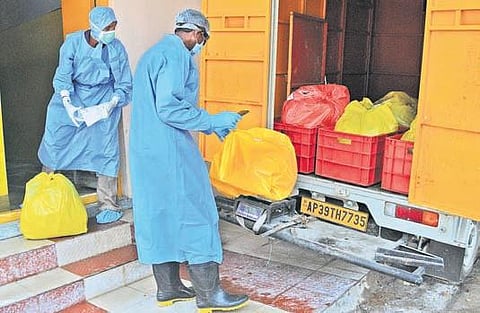

VIJAYAWADA: As masks and personal protective equipment (PPE) kits need to be disposed each time after hospital staff attend to a coronavirus patient, around 1,570 kg of biomedical waste were collected from the Vijayawada Government General Hospital (GGH) over the past 23 days. City-based Safenviron, empaneled by Andhra Pradesh Pollution Control Board (APPCB), has been treating biowaste collected from Krishna and Guntur since 1999.
“Before Covid-19 hit the city, my company collected 3,500 kg of biowaste from the GGH every month. Now we are only concerned with the waste generated from the treatment of Covid-19 positive or suspected patients, which though less in quantity, but are much more dangerous,” said V Venkateshwara Rao, director of Safenviron, which collected over 1,500 kg of the waste from the GGH from March 22 to April 12.Rao explained the process of collection, transportation and treatment of the waste: “The hospital staff dispose of the waste in yellow coloured non-chlorinated plastic bags, which are kept at a designated place where none are allowed. Everyday, our vehicles go to the spot and collect them. We have a barcode system to note the quantity collected each day. We scan the barcoded weight and issue receipts accordingly.”
The bags are transported in dedicated vehicles by workers who wear PPE kits and are trained in handling the situation. Then, at the Chillakallu plant, the waste undergoes thermal treatment at 850 degree Celsius in an incinerator’s primary chamber and at 1050 degree Celsius in the secondary chamber. The ash is safely sent to a treatment, storage and disposal facility (TSDF).
“In the State, we have two TSDFs — at Visakhapatnam and Nellore. Transportation of the ash is taken care of by another agency, Ramky Enviro. As per the PCB directions, the ash is equally hazardous and so has to be transported and disposed of carefully.” However, sanitary workers of the Vijayawada Municipal Corporation (VMC) are still at high risk as they collect waste from households and quarantine centres.
“The VMC workers collect biowaste from households and quarantine centres separately, and hand them over to us at five designated places,” added Rao. The agency has collected more than 30 kg of used masks from just households in Vijayawada, and 267 kg of waste from quarantine centres across the Krishna district in the past 23 days.
“The sanitation workers engaged in waste collection from areas which have corona patients (that are in red zones) have PPE kits. The remaining wear masks and gloves,” informed Vijayawada Municipal Commissioner V Prasanna Venkatesh. “Masks should be disposed of responsibly. They should be wrapped in a separate cover before being thrown in garbage bins, which should not be opened frequently,” suggested Rao.
Treatment in high temperatures
The biowaste-filled bags are transported to Chillakallu treatment plant in dedicated vehicles by workers who themselves wear PPE kits and are trained in handling the situation. There they undergo thermal treatment at 850 degree Celsius in an incinerator’s primary chamber and 1050 degree Celsius in its secondary chamber. The ash is safely sent to a treatment, storage and disposal facility